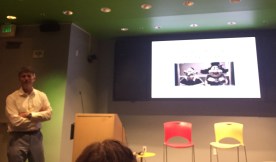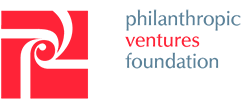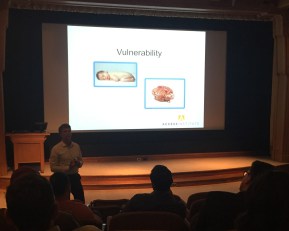De-Stigmatizing Mental Health Services: An Interview with a Bay Area Inspire Award Grantee
In 2014, PVF awarded grants to six young Bay Area residents for coming up with fresh ideas for building better communities. These awards were made possible through the Bay Area Inspire Awards, which provides $10,000 grants to 18-30 year olds living in San Francisco or Alameda Counties with an innovative, community-oriented idea. PVF interviewed each grantee to give you a sense of what these amazing individuals are doing to change their communities for the better. Below is our third interview with Megan Winkelman, who is using her award to focus on mental health awareness.
 In the past seven months my project evolved from creating an online map resource for patients seeking mental health care, to developing an awareness campaign that supports community-wide mental health de-stigmatization and provides spaces for facilitated dialogues about mental health, including tech employees and other community members. I partnered with the community mental health clinic and training center, Access Institute for Psychological Services (Access Institute) for the first two events. We developed a screening and discussion night around the film “Mary and Max.” The film explores a variety of mental health issues and we followed the screening by a presentation and community discussion.
In the past seven months my project evolved from creating an online map resource for patients seeking mental health care, to developing an awareness campaign that supports community-wide mental health de-stigmatization and provides spaces for facilitated dialogues about mental health, including tech employees and other community members. I partnered with the community mental health clinic and training center, Access Institute for Psychological Services (Access Institute) for the first two events. We developed a screening and discussion night around the film “Mary and Max.” The film explores a variety of mental health issues and we followed the screening by a presentation and community discussion.
As we plan our next set of community events, we are also investigating ways to share mental health patient education and local resources with high school and university seniors from the Bay Area, many of whom stay in the region for their first job (a stressful transition), and may delay seeking help until they reach a crisis point.

As part of her project, Megan coordinated a screening and discussion of the film, “Mary and Max” to jumpstart a conversation about mental health.
We have found that stigma impedes mental health treatment for Bay Area residents in both high and low-income brackets. We hope that by increasing awareness (throughout the community) of how mental health care works and who the community’s mental health providers are, organizations such as the Access Institute will see more patients at all income levels, allowing them to expand their services and start treatment earlier when symptoms begin, when recovery is much more likely.
In a sense, my project has gone from using tech tools in the service of Bay Area community mental health to uniting the tech community with the wider Bay Area community in a discussion about improving the mental health of all. My community partner Access Institute and I hope that the high unmet need for mental health services in both these populations will unite them across their socio-economic differences, and that this union may even inspire cross-community collaborations that may include technical solutions to local problems, as envisioned in my original project.
Something that became clear at both events was that the vast majority of Bay Area residents don’t know what mental health services are available to them, and it’s only when their (or their loved one’s) mental health approaches a crisis that they start looking for support. We also received feedback that it was eye-opening for attendees to realize that they don’t need to have a mental illness to benefit from mental health care. For example, having a family member struggling with a disease can affect the rest of the family, and they may benefit from the therapy that Access Institute offers.
My mental health advocacy journey began while staffing the Bridge Peer Counseling Center in the winter of my freshman year at Stanford University. I met a deeply depressed teen mother from East Palo Alto who was struggling to finish high school, raise her baby, recover from childbirth, and file a restraining order against her abusive ex. She was too exhausted to cry; the weight of her pain thickened the air between us, and her story stayed with me long after we had left that faded green couch.
When I received the Inspire Award in June 2014, I intended to create a map of mental health providers designed for Bay Area community members seeking out mental health care for the first time. After our Inspire Awards board and recipient meeting, my productive conversations with the group directed me to consider creating resource materials for a different audience: providers of social services and health services who refer patients to mental health providers or liaise with such providers.
In this way, my project goal departed the creation of an online resource map in favor of hosting events with Access Institute for both tech employees and community members as part of an effort to raise awareness of affordable resources for mental health care and an anti-stigma campaign.






